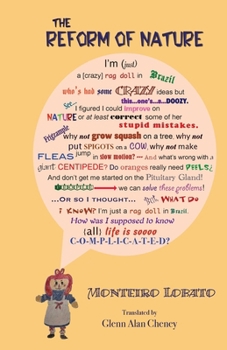The Reform of Nature
Monteiro Lobato is one of Brazil's most popular and beloved writers. He is best known for his series of imaginative children's books about Yellow Woodpecker Farm, or, as they say in Brazil, S tio do Picapau Amarelo.
The Reform of Nature is a novella that can be appreciated by children and grownups. Their reasons would be different, but both are astonished by the crazy creativity of the tale.
Lobato was very concerned about the state of the world. Reform starts off with civilization in need of serious reform-European leaders trying to establish peace after the devastation of World War II.
But the plot is soon shunted into the shenanigans of Em lia, a feisty rag doll with big ideas for reforming nature to correct its mistakes. She replaces a cow's udders with spigots and puts its tail in the center of its back so it can swat flies from the head. She frees oranges from the inconvenience of peels. She makes fleas and mosquitos easier to kill. Fiddling with pituitary glands, she ends up with giant fleas, worms, and centipedes. Soon she realizes what a mess she's made.
Such a tale is fun for kids but terrifying to adults who understand what Lobato was saying between the lines in 1941.
The Reform of Nature is a rollicking ride in a wacky world all too reminiscent of reality. And it's well worth the trip.





